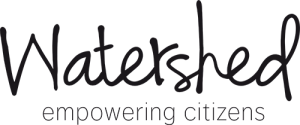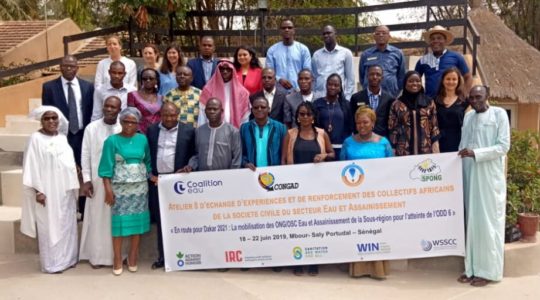In 2018, the ‘Global Review of National Accountability Mechanisms for SDG6’ study was launched, which evaluated the existing national accountability mechanisms in 25 countries to analyze key bottlenecks as well as opportunities for different stakeholders to reach water and sanitation targets of Sustainable Development Goals (SDGs). This accountability study was led by Coalition Eau, End Water Poverty, Watershed Empowering Citizens Consortium, the Water Supply and Sanitation Collaborative Council (WSSCC) with the support of Sanitation and Water for All (SWA) along with other key partners and coalitions at country and regional level. A crucial takeaway from this study was the need for a strong representation of Civil Societies (non-governmental organizations, community-based organizations, and networks) in the national planning and monitoring of water and sanitation services and for more accountability on achieving progress towards the SDGs.
To discuss the follow-up steps to the 2018 Accountability study and share experiences on capacity building of Civil Societies, the francophone West Africa and Central Africa CSOs from 10 countries (Benin, Burkina Faso, Cameroon, Chad, Guinea Conakry, Mali, Mauritania, Niger, Senegal, Togo) met in Mbour-Saly Portudal (Senegal) from 18th-22nd June 2019. As part of the momentum that began in 2008, Coalition Eau organizes this workshop every year with francophone collectives, and this 8th workshop was organized with the support and participation of its international partners (SWA, Action Against Hunger (ACF), IRC, Water Integrity Network (WIN), WSSCC and Niyel). Another key objective of this workshop was to create space and common thematic statement for Civil Societies for the 2021 World Water Forum in Diamniadio, Senegal.
During the workshop, Civil Societies shared advocacy best practices on how they are strengthening the capacities and expertise of civil society to advocate for strong accountability mechanisms nationally.
- Mbaye Niang from CONGAD and SWA focal point in Senegal explained the steps taken by the network:
- In July 2018, CONGAD organized a national workshop for capacity building of CSOs to strengthen the dialogue and collaboration with the Government. This workshop helped in developing a civil society action plan and appropriate tools to ensure efficient monitoring of the implementation of SDG6.
- Established a dedicated CSO platform on Water and Sanitation in Senegal (POSCEAS) for consultation, mobilization, and coordination for advocacy efforts to make an efficient contribution to water governance in Senegal.
- Mobilized CSOs to participate in the Regional Preparatory Workshop for the Voluntary National Reviews (review mechanism to monitor the progress of SDGs) for the 2019 High-Level Political Forum (HLPF).
- Roukiattou Ouedraogo from SPONG and SWA focal point in Burkina Faso informed the workshop about the organization of a national workshop to share the results and recommendations of the accountability study. Their network is taking the following steps to strengthen accountability mechanisms in the country:
- SPONG through the Water, Sanitation and Hygiene (WASH) thematic group collaborated with the Ministry of Water and Sanitation (MEA) for the establishment of a consultation framework between the MEA and the Civil Society.
- Developing a 5-year project to strengthen the CSO participation and Citizen Control for the implementation of the National Water Strategy (NWS).
- Accountability study consulted in the preparation for the Voluntary National Reviews in Burkina Faso.
- Andre Zogo, SWA CSO focal point in Benin presented the activities from his network- CANEA
- Capacity building of municipalities on transparency and integrity with the support of WIN.
- Strengthening the capacity of Municipal Drinking Water Association (ACEP), members of the Citizen Participation Unit (CPC) and water users to produce alternative reports to monitor the progress made by Public Drinking Water Service (PES) at the level of community in the Ouémé Delta region.
- Akoegnon Adjo Kadjobe, CCEABT from Togo explained the activities of her organization:
- To strengthen Citizen Control of Public Action (CCAP), six workshops were conducted across the country, reaching around 30 CSOs working in the WASH sector. The network also shared the results of the accountability report during these workshops.
- CCEABT submitted an alternative report to track sector progress, produced by WASH CSOs to Working Group of Civil Society Organizations on Sustainable Development Goals (GTOSC).
- As part of preparations for the 2019 SWA Sector Ministers’ Meeting, CCEABT, along with other Togolese CSOs identified three commitments for the Civil Society in Togo. These commitments focus on establishing a culture of accountability at all levels by establishing local CSO data platforms by 2021 and focus on producing alternative reports to monitor the commitments made by the Government of Togo.
On the last day of the workshop, the CSOs decided to call this collective- L’Alliance d’Afrique Francophone pour l’Eau et l’Assainissement. The acronym, AAFEA has a hidden meaning, which when translated into the local Wolof language in Senegal, means ‘peace’.
This blog is written by Anjani Kapoor and was first published on the SWA website.

